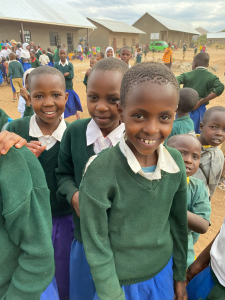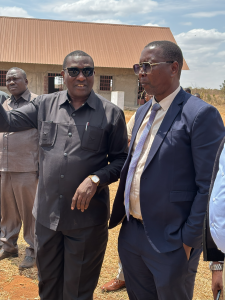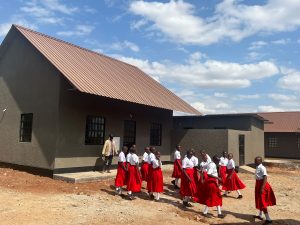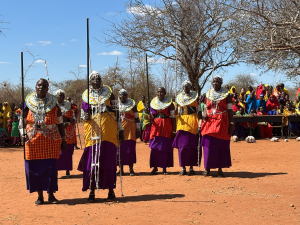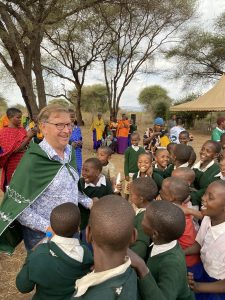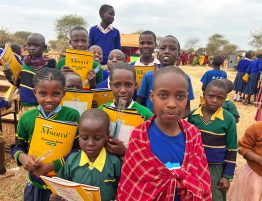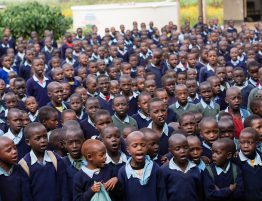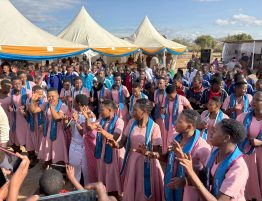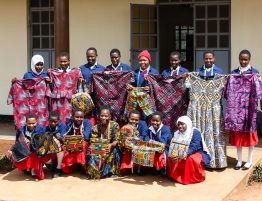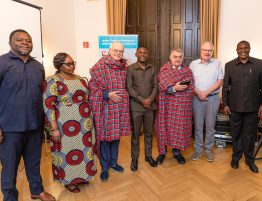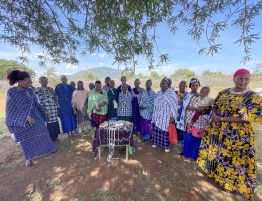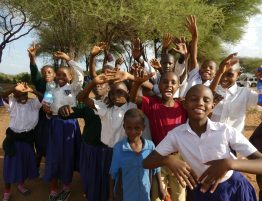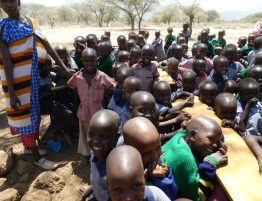
Komolo Primary School
On our last visit to Tanzania, we were accompanied by District administrator Stefan Rößle and a small delegation from the Donau-Ries district. Stefan Rößle is also chairman of the association ‘1000 Schools for Our World’, with the help of which we were able to build new classrooms, a toilet block and a residential building for teachers in Komolo. These were handed over to the government as the school operator at the end of August. It was a colourful celebration, with the children singing and dancing to express their gratitude for the new classrooms and other buildings. In addition to the government representatives, members of the community also thanked ‘1000 Schools for Our World’, ECLAT and upendo for the expansion of the school in the village and the associated improvement in their children’s educational opportunities.
New secondary school for girls
Although the work on the new secondary school for girls had already started at the beginning of the year, we celebrated the laying of the foundation stone for the school at the end of August. The first girls are expected to start attending classes there in January. Besides the classrooms, the dormitory, toilets and the first houses for the teachers also need to be built in time for the start of the school year. Fortunately, the drilling for groundwater was successful (even though the borehole is 150 metres deep), so there will be enough water for building and later for living on the school grounds. The guest of honour on this day was the Tanzanian Minister of Education, Prof. Adolf Mkenda. His presence demonstrates the importance the government attaches to education, especially for girls, and the appreciation the government has for our commitment. He thanked ECLAT and upendo for their dedicated efforts to ensure school education in Tanzania and asked us to pass on his thanks to the donors in Europe. We enjoyed a lively celebration with singing and dancing, and many speeches in which the community was repeatedly encouraged to take care of their children’s education and send their children, including their daughters, to school.
Residential home for young mothers
Construction of the ECLAT training centre for teenage girls is progressing rapidly. After leaving school and as an alternative to forced marriage, the first intake of teenage girls is already learning basic craft skills there, which will enable them to earn their own income in the future. To ensure that they are not forced to drop out in the event of an unwanted pregnancy, we have built a small residential home for young mothers with small children on the grounds. Family members look after the babies during the day so that the young mothers do not have to interrupt their education, as is otherwise common in Tanzania. The opening of the residential home at the end of August came just in time: only two weeks later, one of our students gave birth to a daughter. We were able to see just how much the community appreciates our commitment to girls and the construction of the residential building for young mothers at an event in a village a little further away. In his public speech, the village chief praised ECLAT’s training centre for teenage girls, but particularly emphasised the construction of the residential building for young mothers as a sign of deep appreciation.
Water project for Orkiringo
Water is scarce in the Maasai steppe and often has to be fetched from many kilometres away. Not to mention that usually only polluted surface water is available, which causes many diseases. The situation is particularly bad at the Orkiringo primary school we built in recent years: here, water has to be fetched from almost 20 kilometres away. We were able to successfully drill a deep borehole there, from which clean groundwater is now pumped into water tanks, enough for the pupils and the neighbouring population. The handover ceremony at the end of August was a moving celebration, at which the population expressed their enthusiastic gratitude for the clean water now available to them locally.
Insights into ECLAT’s and upendo‘s aid projects in Tanzania: My travel impressions
In August 2025, I had the opportunity to take part in a trip organised by upendo e.V., which impressed me in many ways. Even though I was already familiar with some of the projects from a previous trip, this time I gained some new perspectives that moved me once again. It became particularly clear what upendo is achieving together with its partner organisation ECLAT in northern Tanzania and how much support there is in the local communities and at the political level.
On the way to Toimas’ Guesthouse in Emboreet, where Philomena provided us with delicious meals for the next five days, we visited the school in Loosiririmi. During my last visit, there was no school there, only the wish for one. That is why I had asked for donations after this trip, and the construction project became part of the initiative I co-founded, ‘1000 Schools for Our World’. It was very moving for me to see what has been achieved since then. But it was also striking that some children are not sent to school because the journey there would cost too much water – water that their parents need for their daily needs. In this high-altitude, arid region, boreholes 130 metres deep are needed to build a school well. Construction is therefore a financial and technical challenge.
Another highlight was the inauguration of a new school campus in Komolo with classrooms, teachers’ accommodation and latrines – also a project within the framework of the ‘1000 Schools for Our World’ initiative. The celebrations, with Maasai songs and a cow as a thank-you gift, showed how important school construction projects are for the entire community.
The meeting with the Tanzanian Minister of Education, Prof. Adolf Mkenda, was also particularly exciting. He emphasised that developing a functioning education infrastructure takes time and ‘does not work like switching on a light’. Even though education is the responsibility of the government, he believes that actors such as upendo and ECLAT are still indispensable, especially in view of the planned introduction of ten years of compulsory schooling instead of seven. This will require many new secondary schools in the coming years. For me, the move towards ten years of compulsory schooling underlines that Tanzania attaches the highest priority to education and considers it key to successful development – definitely also a kind of appreciation for our work as NGO and for our supporters.
I also found the insights into the lives of the families and into upendo’s work with girls and women very important, for example by opening accommodation for young mothers at the training centre for girls. Here, young women have the chance to get their kids looked after while they finish their education. I’m really impressed by upendo’s comprehensive approach and how they’re prepared to adapt their projects to meet changing needs, so that education has a lasting impact in the region. One thought really struck me: the word for “school” in Swahili is “shule”. We heard it repeatedly in speeches on site – a tacit legacy of the German colonial era that also reminds us of our historical responsibility. Upendo is aware of this particular responsibility. Honouring and respecting local structures and values in cooperation with its partner organisation ECLAT is one of upendo’s particular strengths and achievements in this field of responsibility.
I would like to thank upendo for the insightful journey, the encounters and the precious experiences! It was wonderful to see how upendo and ECLAT work with foresight, commitment and warmth. We at ‘1000 Schools for Our World’ are proud to be their partners and are delighted that we have been able to realise several projects in the past as part of our cooperation and will continue to open up new opportunities for the local community in the future.
Stefan Rößle, District administrator in the Donau-Ries district
Photos: Fred Heimbach, Ramona Ruf, Stefan Rößle
Layout: Heike Ponge
Translation newsletter (German-English): Marita Sand

